The Top 8 Greatest Inventions of the Mycenaeans
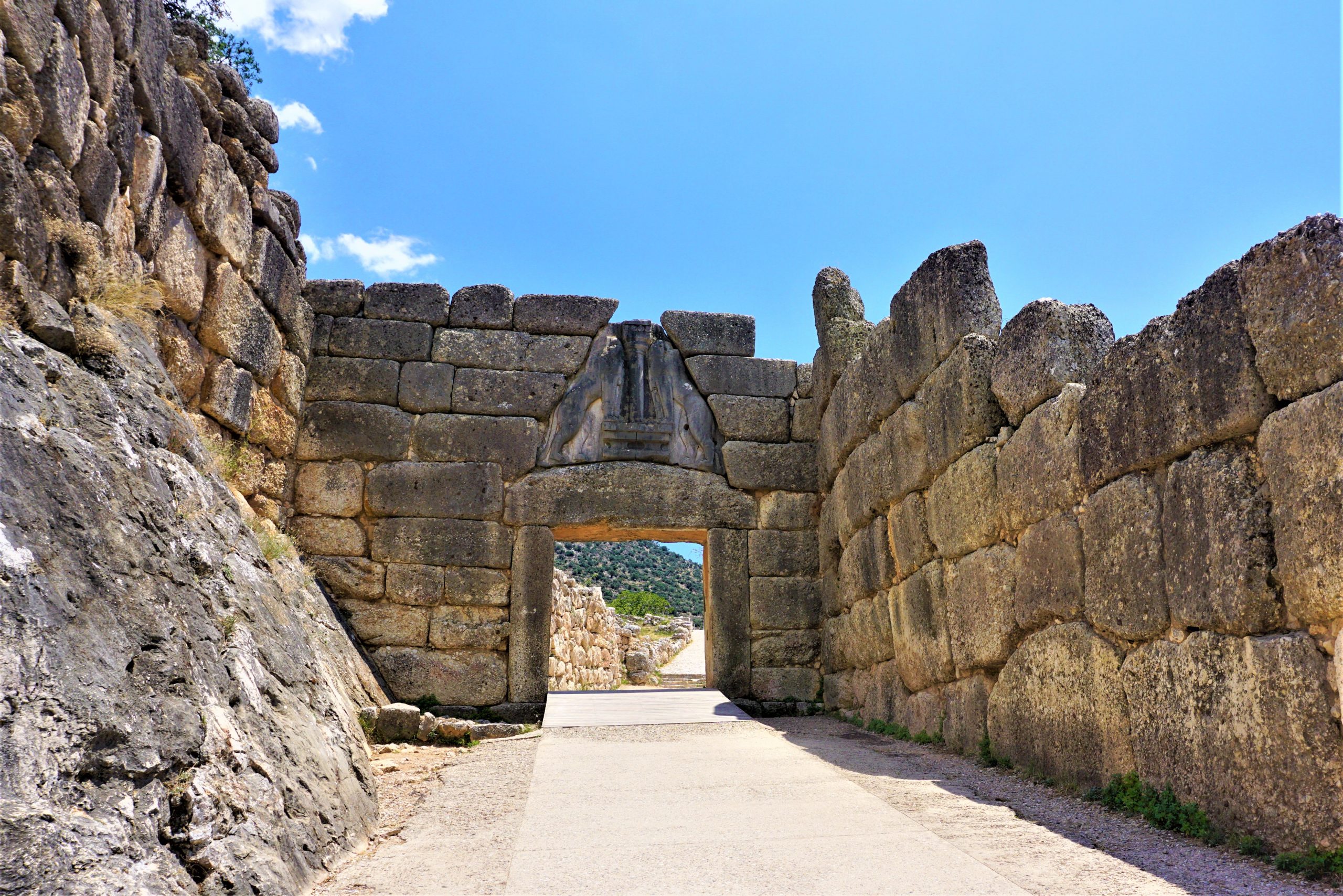

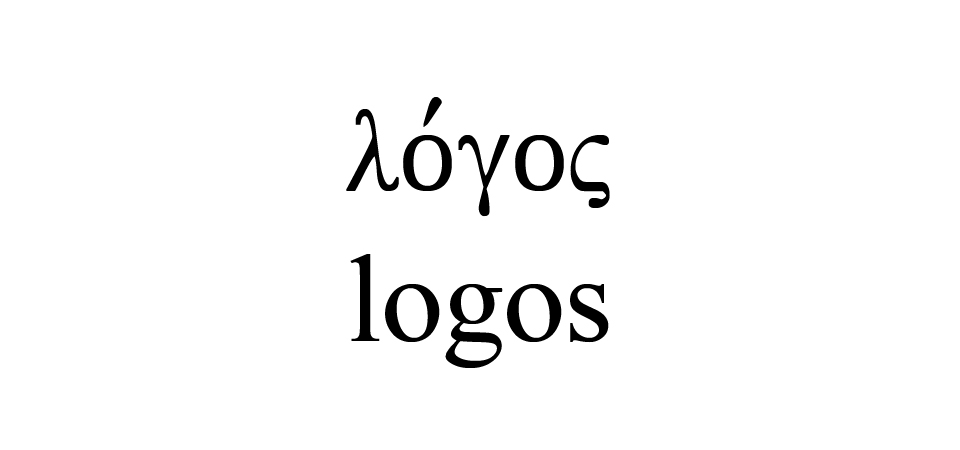
Written by Visnja Bojovic, Contributing Writer, Classical Wisdom
When I was a child, I was very confused by the sentence: ”In the beginning was the Word, and the Word was with God, and God was the Word.” What did it all mean? Why word? I was always a word lover, in fact, and I knew that words were powerful, but this was just too confusing.
My next encounter with this word was when I entered a high school of philology and found out that the word philologist meant a lover of words (φίλος+ λόγος). I was lucky enough to study ancient Greek as early as in high school, so I soon started learning that this concept of logos was much wider than simply meaning a word. In fact, I learned soon enough that Greek has a completely different word for it, derived from the same stem (λέξις).
Of course, words are meaningful per se and they are often omnipotent, but we have to do the justice to logos and try to shed some light on its insanely wide and complex nature.
As with nearly all ancient Greek words, logos has many meanings, the most important of them being word, statement, story, thought, principle, reason and speech. It can be used in a technical, specialized sense or as a common term.
When used in a technical manner, the meaning will depend on the context, but there are two main distinctions to be made. It can either refer to a human reason/speech or to some kind of universal intelligence/principle.
The first one to use logos in a specialized sense was one of the pioneers of philosophy whom we all know: Pythagoras.
He believed that the world is based on three main principles. The first one he called Monad and it represented the unification of whole reality, the singularity of everything. The second one was called Dyad, a principle of diversification and differentiation. These principles may sound contradictory until you count in the third one, the one called Harmony. Harmony represents the relation of one thing to another, represented by the proportion between numbers, geometrical shapes or tones. This Harmony is based on logos, the role of which is uniting these two principles.
Heraclitus had a very peculiar doctrine that centered around logos in a specialized sense. Most readers probably know about Heraclitus’ famous assertion that you can’t step into the same river twice since everything constantly changes.
However, what we perceive as unchangeable is the principle that underlies Heraclitus’ ideas on change. For Heraclitus, this principle is logos. Thus, for him, the world is a collection of unified things that are in a structure arranged by logos. Human wisdom is tasked with understanding this principle as all our actions depend on the participation in this divine logos.
With Plato the story gets a bit more complex, since he had a variety of ways he used this term. Maybe the most straightforward one would be the understanding of logos as opposed to mythos (μῦθος), where logos is perceived as the true, analytical account.
In Phaedo, Plato explained that the characteristic of the true knowledge is the ability to give account, logos, of what one knows. In Theatetus, Socrates described logos as the distinguishable characteristic of a thing.
With Aristotle, we approach the definition of logos that is close to Latin ratio, as well as the modern notion of logos. Aristotle understood logos as the reason and rationality, especially in the ethical sense. We can see this in some English words such as rational or rationalism.
He also used it in the meaning of a mathematical proportion, which we can see in the English word ratio, but this can probably be traced back to Pythagoras.
Last but not least, we will look at the Stoic interpretation of this term. For the Stoics, the perception of logos is very similar to that of Heraclitus. It is a creative force in the universe, also material as Heraclitus perceived it, identifiable with fire, as well as nature and Zeus. There was also a Stoic linguistic theory that distinguished between the interior and exterior logos.
Judging by all these accounts, we can conclude that this mysterious ”word” in the biblical sentence was more than just a word, and it wasn’t a Christian invention, either. We see that logos was beyond words, but at the same time marking the power of words and human expression.

Written by Paul Bates, Contributing Writer, Classical Wisdom
The ancient Greek language is believed to have been in use between the 9th century BC and 6th century AD, which spans the Archaic period, Hellenistic period, and the Classical period in Greece. It was preceded by the Mycenaean Greek and replaced by Medieval Greek, which is the language of modern-day Greece.
Dialect
Ancient Greek contained many dialects, among them Doric, Attic, Ionic, Aeolic, and Arcadocypriot. These dialects were discovered in various ways, some presented in inscriptions while others were found in literature, such as history books. There is also a different dialect of the ancient Greek language called Homeric Greek. This dialect was believed use for entertainment.
Writing Method
From different artifacts discovered written in ancient Greek, there is evidence showing that the language was written from right to left, having adopted the modern Arabic and Hebrew form. However, over time, the language evolved, and the writers changed the format and started writing from left to right. Many plays and poems that were written using ancient Greek show these features.
For example, Greek epics such as the Iliad and the Odyssey were written from right to left and contain some of the longest Greek words in written literature. Not the longest, however. That can be found in the play Assemblywoman by Aristophanes. It contains the longest-known written word in ancient Greek literature, consisting of 171 letters.
Influence in English
The English language is very influenced by the ancient Greek language. Numerous words — such as mathematics and biology — find their origin in Greek words.
Word Genders
All words in the ancient Greek language had one of three genders: feminine, masculine, or neutral. This was purposeful: in ancient Greece, there was a belief that all aspects of life took up three forms (Bakker, 2010). Therefore, the adoption of three genders meant that a word would take either the male, female, or neutral form.
Different punctuation
In ancient Greek, punctuation was used to differentiate it from other languages. For example, the semicolon in ancient Greek was used as a question mark. Additionally, using different punctuations for different meanings meant users could communicate secretly, without passing their literature on to anyone they did not intend to.
In conclusion, the ancient Greek language is seen by many researchers as the origin of modern Greek and instrumental in the development of many languages.
Paul Bates is a freelance history writer at TOK Paper Writing and College Essay Writing Service. He is also an online tutor and provides historical research as well as full-service editing at MLA Format Service.
References:
Bakker, E. J. (2010). A companion to the Ancient Greek language. John Wiley & Sons.
Silk, M. (2010). The language of Greek lyric poetry. A Companion to the Ancient Greek Language, 424-440.
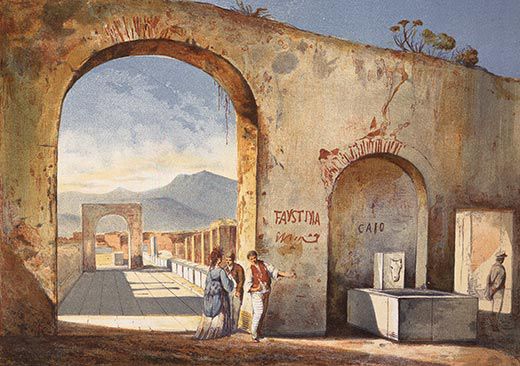
By Visnja Bojovic, Contributing Writer, Classical Wisdom
How antiquity is perceived and received has always depended on the era. Sometimes it was due to the prevalence of a certain political program (the promotion of Roman Empire under the rule of Napoleon and the advantage given to the Roman Republic during French revolution, for example). Most of the time, however, it’s because we observe antiquity through “modern eyes”.
When learning something new, we usually make either conscious or subconscious assumptions that are based on our own experience… and this is a natural process. However, it can lead us to wrong conclusions, and make us oversee some points that are crucial for understanding (or, more likely, trying to understand) the ancient world.
The most convenient example may be ancient Greek comedy. The word “comedy” triggers a completely different image in the mind of a modern reader from the one in the mind of a man born in classical Greece. In other words, if a reader of modern comedy (presumably the one without the knowledge of ancient Greek drama) approaches Aristophanes’ work in anticipation of an easy-to-understand humor that will make them break out in laughter, they may end up disappointed.
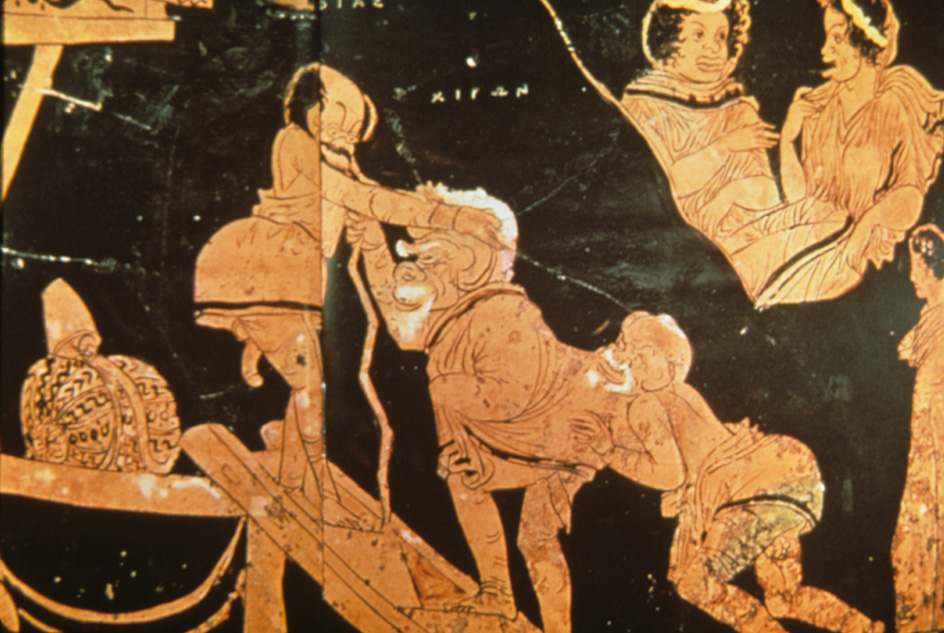
It does take a little work to find Aristophanes funny, but it’s well worth it…
This is by no means impossible to achieve, but does require some amount of time spent inquiring about 5th century Athens and its social customs (a good and extensive commentary can help, too). Reading the comedy after that can, besides laughter, gives us valuable insights into many details of the ancient world.
For these reasons comedy enjoyed the deserved attention of many scholars and many of its aspects have been thoroughly studied. For graffiti, on the other hand, we cannot say the same. Difficult to define, difficult to trace, and difficult to interpret, graffiti*** has always been on the margin of research, at least in comparison to other types of inscriptions.
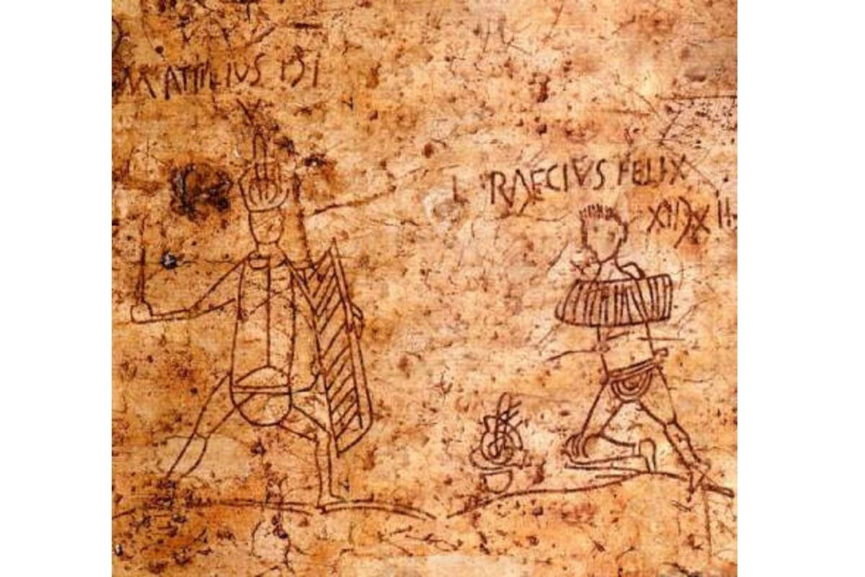
Graffiti in Pompeii of Popular Gladiators
Due to a wide variety of graffiti preserved in the ancient city of Pompeii, some attention, however, was given to the rich world of ancient graffiti… and things they can teach us about those times.
Here are some indications we can attest in the practice of graffiti that either challenge our view of antiquity, or show us once again how strongly conditioned we are by the world we live in and its notions:
The Social Significance of Graffiti
Nowadays we can see many types of inscriptions wherever we go, from public announcements to laundry commercials. And yet, there is something rude, even violent, when we see someone’s love confession on a wall of a public building. The reason? The love confession is completely private, and as such, it violates the public space. Moreover, there is no form of authority behind love scribbles!
This is one of the reasons that ancient graffiti is often disregarded as a viable source for studying antiquity. However, their presence in central and visible spaces (public spaces, inside houses, and around workspaces), suggests that ancient people did not share our views.
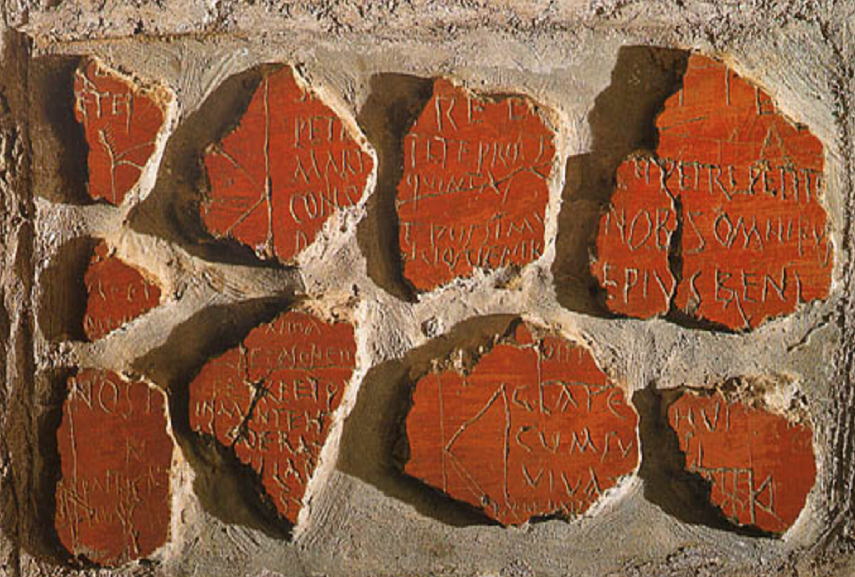
Fragments of Roman graffiti. Image via lukeirwin.com
For ancient Romans, leaving a personal mark was commonplace in many writing practices – the names of people who paid for a monument to (oddly enough) ads for house rent. Therefore, we can conclude that such a strong division between public and private is, well, a modern phenomenon.
(In)formality and social classes as seen in Graffiti
Graffiti has always been represented as an informal way of self-expression, which led to thinking that in ancient times, graffiti was produced exclusively by lower social classes. However, there is a decent amount of graffiti in Pompeii that expresses political opinion as well as ones that can be even associated with military personnel. This teaches us that being a member of high society in ancient Rome did not necessarily mean being exclusively formal. Even though it is difficult for us to imagine a serious member of Roman high class writing nasty things about their political rivals, it sure is fun and casts a different light on our image of ancient people.
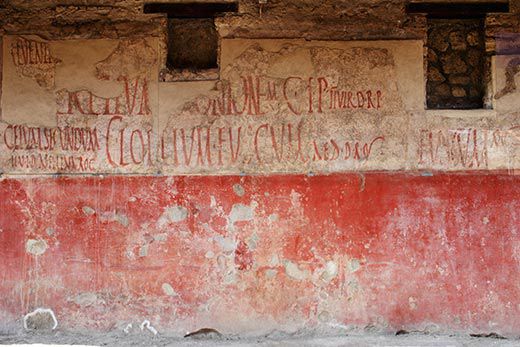
Roman Graffiti could be a respected – even interactive – form of writing
Literacy and Graffiti
When we think about modern graffiti, it is highly improbable that the first image that comes to us will be a quote from Shakespeare. And keep in mind: we live in an age where the lack of literacy is shocking. For ancient Romans, however, it was quite common. We don’t know the exact percentage of people that were (fully) literate, but the numbers are definitely not promising.
However, the peculiarly high amount of quotations present in ancient graffiti, along with brief poems and even wordplays, show that our image of ancient literacy is maybe different from the reality. This still does not mean that a significant number of Roman people were literate in the real sense of the word, but, as some scholars have suggested, there is a possibility of different kinds of literacies that existed throughout the empire.
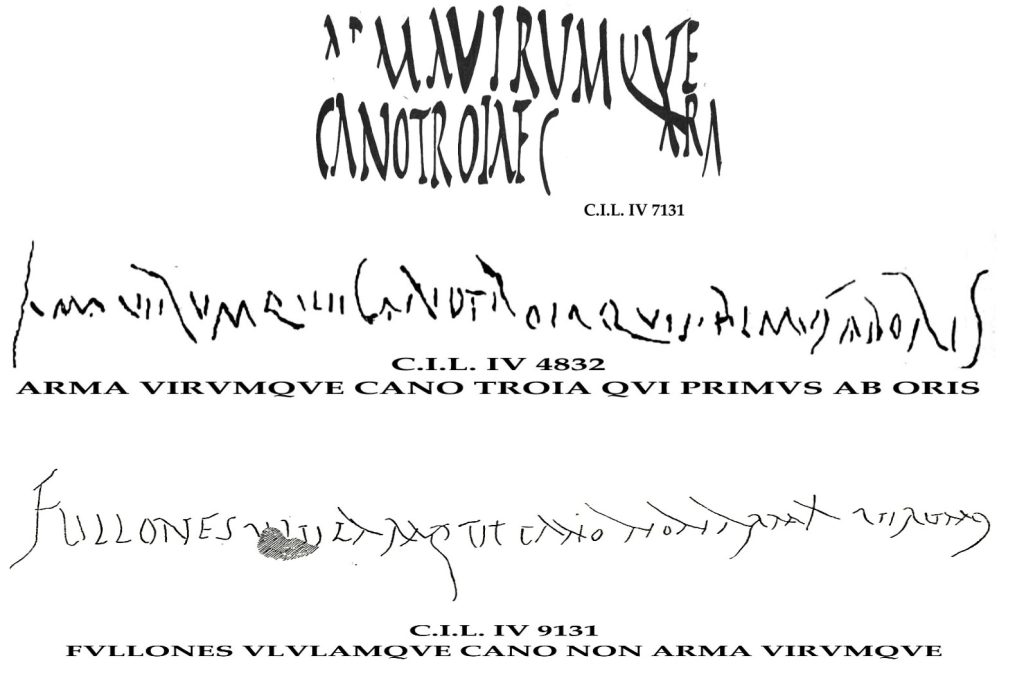
Three inscriptions referring to the opening line of the Aeneid
For example, some quotes from Roman literature might have received the status of idioms, so people used them without actually understanding the original text. The question of literacy in ancient Rome is quite complex, but the abundance of materials found in graffiti certainly has the potential of casting some light on it.
Although it is fun to read silly and obscene graffiti that reminds us that ancient humans were more similar to us than we would have expected, we should not fail to recognize their value in the research on the cultural and quotidian aspects of life in ancient Rome.
***Editor’s Note: Depending on where you read about Graffiti, you may be surprised by this sentence. That is because often in formal writing settings, the word ‘Graffiti’ is the plural version of ‘Graffito’. However, while speaking, Graffiti is always used as a ‘mass noun’, requiring a singular verb. Ah! What’s an editor to do? While on the one hand, we feel it’s important to acknowledge the correct rules of grammar and a word’s true etymological roots, on the other hand, we want the reading experience to be enjoyable and easily understood. As we are dedicated to making the classics as accessible as possible, we purposefully choose the latter and made ‘Graffiti’ a mass noun, as most speak it.

The other day a student told me that, during her studies as an art student, she had to sculpt a small statue as an assignment for one of her courses. She did so without having put much thought into it. The professor approached her and started praising her work, giving it much more and much different meaning than the one she originally wanted to convey by making the statue.
My student did not say anything, as the situation was favorable to her, but there sure are situations in which misinterpreting a product of art can lead to misunderstanding and forming a wrong image of the author and the message he/she originally wanted to get across.
This is often the case with quotes from literature, especially the ancient ones that we regularly use for our own purposes—whether it is to express an attitude, to defend an opinion, show our feelings, or even just to sound smart.
We write a sentence, wrap it into quotation marks and undersign an author to it as if it was his/her personal opinion. However, do we ever stop to wonder where these thoughts come from, and what the sentiment of the author originally was?
What if even half of those phrases were just opinions expressed by the characters in the work, and not those of the author? For those of you that still haven’t watched Fight Club: what if I told you that Helena Bonham Carter was not the one saying, “And suddenly I felt nothing”, and that all those screenshots with that quote under her face were misleading?
Unfortunately, this misattribution happens just as much with the sayings and maxims of the ancient world.
Here are a couple of Latin proverbs that are common but which are often used without much knowledge of their context or background:
1. Omnia vincit amor (Love conquers all)
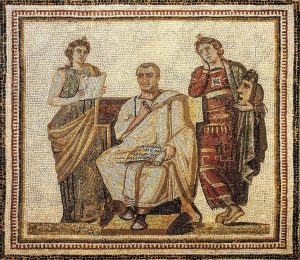
Virgil, holding a volume on which is written the Aenid. On either side stand the two muses: “Clio” (history) and “Melpomene” (tragedy). The mosaic dates from the 3rd Century AD. Credit: Bardo National Museum.
This famous line belongs to one of Virgil’s bucolic (pastoral) poems. The world of bucolic poetry (as it was known to Virgil) used to be idyllic and distant from the noise and crowd of the city. It was a world where shepherds could sing (often competitive singing) about their love and passion, celebrate nature or play syrinx and Pan’s flute.
Virgil used the same scenery, but wrote about real people, his contemporaries, represented as shepherds. The main character of this bucolic poem is the elegiac poet Gallus, represented as a shepherd in the lands of Arcadia (where the idyllic scenario is placed for ages of art to come thanks to this particular poem).
This phrase is usually quoted in the defense and celebration of love, and its power to overcome all obstacles. In the poem, Gallus is madly in love and is suffering. We read about the deities coming to rescue him and talk him out of love, but it is all in vain.
Finally, love wins, but not quite as we would have expected. Despite all the efforts of the gods, love leads to Gallus’ death, and that is the victory Virgil is referring to in the famous phrase. The main message of this phrase is rather related to the devastating power that love has rather than its ideal victory that leaves the meant-to-be couple satisfied.
2. Mens sana in corpore sano (A healthy mind in a healthy body)
The most famous slogan of many fitness companies has its origin in the writings of an ancient Roman satirist Juvenal, who was active in the 1st century AD (the original thought goes further back in history, as early as 7th century BC, to Thales). His most famous work, Satires (Saturae), is best known for its criticism of Roman society under the rule of the notorious Domitian and his successor Nerva, along with its criticism of mankind as a whole.
The sentence Mens sana in corpore sano belongs to Satire X, one of his most influential poems. The poem is dealing with the earthly ambitions of mankind, and its goal is to show that they all lead to disappointment. What we should pray for, are “a healthy mind in a healthy body, and a strong spirit”. The actual message of the author is that we should nourish our mind and body equally, not that a healthy body automatically means a healthy mind, as has been believed.
3. Homo sum: nihil humani a me alienum puto (I am a man, I consider nothing human alien to me)
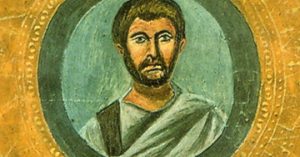
The frontispiece of the famous Codex Vaticanus Latinus 3868, with an image of Publius Terentius Afer.
Taken out of context, this line has been interpreted in various ways. However, its context gives it a surprising turn. This line was written by the famous playwright Terence, in his comedy Self-Tormentor.
The plot revolves around a wealthy old man, Menedemus, who is angry with his son, Clinia, for having a relationship with a penniless girl. He scolds him, holding up his own career as a soldier, which Clinia takes literally and goes to East to live as a soldier.
The play begins with Menedemus working in the field (as a form of self-punishment), and his neighbor asking him why he is working in the field when he has so many servants that can do that for him. When Menedemus tells him to mind his own business, the neighbor answers Homo sum: nihil humani a me alienum puto. Who would have thought that this influential sentence was originally just a justification of poking the nose into other people’s lives!?
4. Tanta stultitia mortalium est! (What fools these mortals be!)
It is well known that Horace’s famous Carpe diem is about making the best out of every moment and not wasting time on pointless things. However, not many people know the stultitia (stupidity) that Seneca refers to in the phrase above is related to the same concept. It is from one of his Moral Letters, titled On saving time—which does a good job summing up Seneca’s general attitude towards wasting time (which he himself didn’t respect too much, but that’s a subject for another article). Here is the full thought:
“What fools these mortals be! They allow the cheapest and most useless things, which can easily be replaced, to be charged in the reckoning, after they have acquired them; but they never regard themselves as in debt when they have received some of that precious commodity, -time!”
Therefore, next time you cannot make yourself productive, instead of Carpe diem, try motivating yourself with Seneca’s line – you’ll be surprised by the effect!
In some of these cases, the proverb did not mean what it was commonly thought to have meant. In others, it turned out to mean much more. Perhaps after reading this you feel as though you’ve lost a proverb you loved to live by. Don’t be discouraged! The ancient world is filled with wisdom and advice for us. Where one saying, maxim, or proverb turns out to lose the meaning you thought it had, there surely is another waiting to be found.
By Visnja Bojovic, Contributing Writer, Classical Wisdom
“Why study dead languages?” “Who needs that?” “Why don’t you learn something that you can actually communicate in?”
These are the questions that every person who has studied ancient languages has been asked at least once…or a hundred times.
As someone that has practiced and taught Latin for years, I am no exception. Maybe before high school, I may have had the same doubtful inquires. But then, when I was fifteen years old, I was introduced to this amazing language.
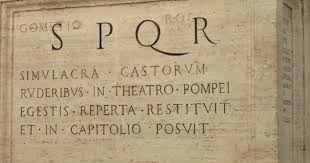
(It is worth mentioning that I was already quite nerdy and rarely had a hard time studying. With Latin I felt truly challenged for the first time, and however cliché it sounds, it made me feel alive.)
Clearly you can tell I’ve been hooked ever since… and subsequently, with time, I’ve learned that there are no universal answers to any of those constant probing questions. I just know that Latin has a lot to offer to everyone, as long as they are open enough to acknowledge it, and persistent enough to study it.
Modern education is pretty straightforward, which is the reason why we have to answer pragmatic questions like those in the first place. As students, we are taught to sit down, learn the rules by heart, apply or show them at a test, and then we are good to go. That is, until the next test, where we will demonstrate some other segment of the subject, often completely unrelated to the previously learned one.
If you ask an average student why they are studying, you are very likely to get “To prepare for an exam” as an answer. What happens after the test with the knowledge you gained for it, does not matter.
It is for this reason that many students struggle with Latin. With Latin, if you want to master the language (or even just pass the test), you have to recycle all the knowledge you have acquired… over and over again.
It is this process which has such value, as it teaches you discipline and persistence.
The thing with Latin is that you constantly learn, and you constantly expand your ways of understanding and interpreting things. When you try to translate Latin without thinking deeply and thoroughly, chances are that the results of your translation will be unsatisfying.
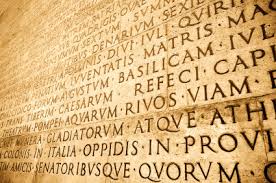
Reciting declensions and perfecting the knowledge of verb tenses is not going to help you when you first encounter Cicero’s eleven-line sentence with two verbs. For that, you will have to rely on your own abilities to compare the previously known with the freshly learned, and to draw conclusions on your own. Engaging in Latin texts challenges you to think in this manner, and before you know it, you will have the same approach in other areas in your life.
It is the perfect way of learning how to think outside the box, with your knowledge as a tool, rather than the goal per se.
I, for one, don’t think many things compare with the feeling of excitement when you manage to make your way out of Cicero’s tangled sentences, or Virgil’s verses full of descriptions, richer for at least one expression and a message from a mind that lived millennia ago.
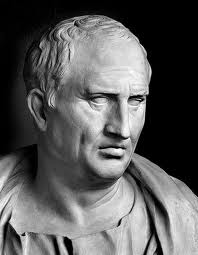
Cicero
After all, these authors wrote thousands of years ago, and yet, here you are, holding their writings in your hands. You can read them in their native language, guided by their conclusions and observations, sometimes without even realizing it. Even the language itself is still used on a quotidian basis, and indeed, you do not need to look up “quotidian” if you know Latin! This ‘dead’ language continues to live, which shows the enormous influence of Latin – not only on European languages, but culture in general.
By studying Latin, we learn about many other things simultaneously, without even knowing it. Just seeing the looks on the faces of doctors when you immediately understand the report written in Latin is priceless. Not to mention other instances of not having to secretly grab a dictionary while teaching English or to look up a complicated word while reading a text in French.
Plus, quickly winning an argument about religion, literature or philosophy, simply by pulling etymologies up your sleeve is always a pleasure. With the knowledge of Latin, you can try to logically reach the meaning, and in most of the cases, it will be correct!
Being able to read first hand about ancient people’s way of living, their belief system, as well as the sometimes incomprehensible and even absurd things done by them and their rulers is definitely worth it. (Caligula’s naming horse a consul, or the origin of Greek drama as a procession with the enormous phallus on the head of it, are just some examples that spring to mind!)
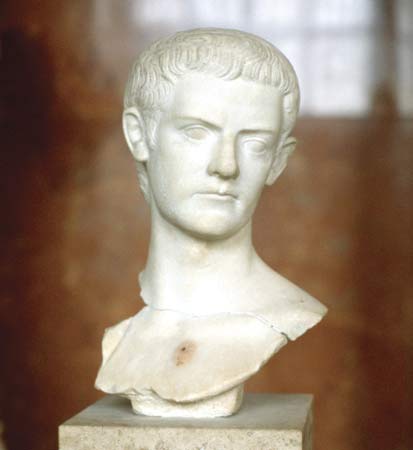
Caligula
Therefore, besides providing us with knowledge, and certainly good laughs, it teaches us to accept something completely different to what we know and opens the door to varied and valuable perspectives.
The goals and ways of learning Latin will depend. You may be studying in order to read the ancient classics, to generally enrich your knowledge and understanding of complex subjects, to learn other languages more quickly and deeply, or even just for fun (and I promise you, there will be an abundance of that!) No matter the motive, you will certainly come out with your goals achieved, and with nothing but positive side effects.